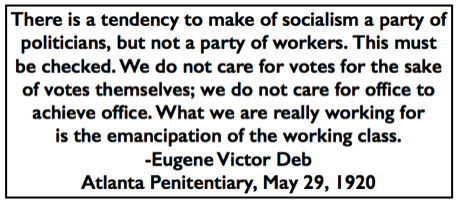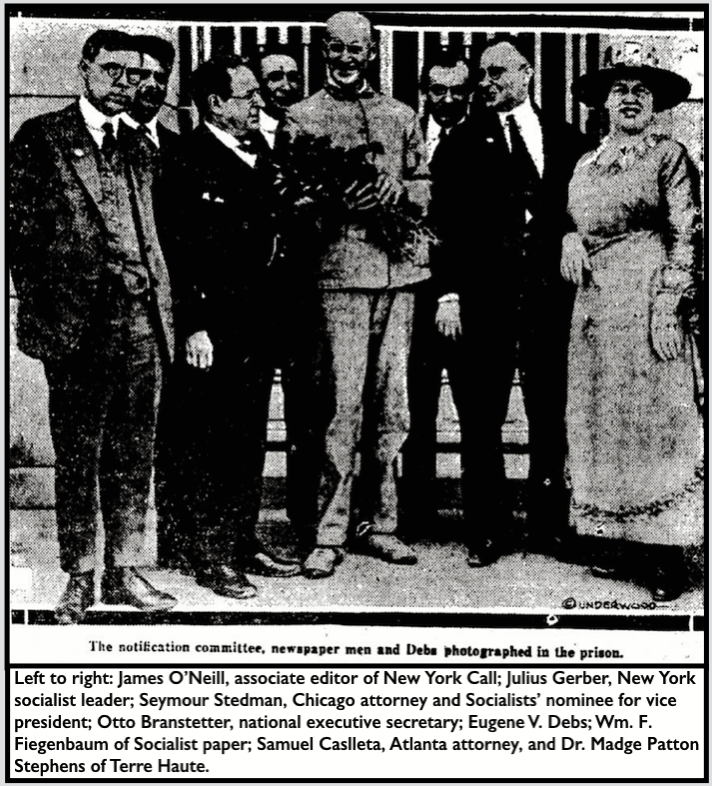 ———-
———-
Hellraisers Journal – Tuesday June 1, 1920
Atlanta Penitentiary – Eugene Debs Accepts Nomination for President
From The Atlanta Constitution of May 30, 1920:
DEBS POINTS WAY FOR SOCIALISTS
———-
Praises Russian Russian Revolution, and
Criticises Platform When Notified of
Presidential Nomination.
—–Expression of keen but friendly criticism of the socialist platform, as adopted in New York city, and of sentiments of sympathy with the Russian revolution, which Eugene V. Debs declared the greatest achievement of all time, were the features of the unique ceremony conducted in the federal prison in Atlanta Saturday morning, when the prisoner was formally notified by a committee of his party that he had been nominated for president by the socialists.
Every possible courtesy was extended the committee and the aged convict by the prison authorities. There were some fifteen people present at the notification, some seven of them socialists, perhaps as many newspaper men, and a fellow prisoner of Debs-Joe Caldwell, of Rhode Island, a member of the communist party.
The exercises were held in a beautifully lighted room on the ground floor, with a nice view through the barred windows. Just before this took place. Debs met his friends in the hallway and kissed each one, four men and one woman-Dr. Madge Patton Stephens, from Terre Haute, his home town, and a friend of his family. Then, for half an hour, a moving picture man snapped all conceivable poses of the nominee and his committee.
Then More Kisses.
During the time the camera was working there came more kisses-when Stedman embraced Debs, kissing him on the cheek, and when the aged prisoner posed with Dr. Stephens, who had been busy ever since their meeting in telling him of the people back home and who presented him with a bouquet of red carnations. There was nothing self-conscious about these embraces. The participation were so glad to see each other again that they did not even notice the newspaper men present, who, to tell the truth, were somewhat nervous lest they should be called to the test.
The nominating speech, very short, was made by James O’Neal, of New York, associate editor of The Call, a socialist publication, and then Debs arose to speak.
He stated that he regretted that he could not issue a formal written declaration of acceptance, but that in accepting before the committee, he first wished to explain why he did so. Then he went over the history of past campaigns, explaining that the nominations had sought him, and that he had been practically forced to accept for what others thought the best of the party. He made it plain that he did not care to be put in the light of a self-seeker. He stated that the reason he accepted now was because it had been pointed out to him that he would be able to heal the wounds and the differences in the party brought on by the war.
Socialist Platform.
Then he came to the platform.
[He said:]
I have read the platform adopted by the New York convention. I wish I could say it has my unqualified approval. It is a masterly piece of writing. It states the essential principles of socialism.
But I wish it could have been couched in a form to make an appeal more effective to the working classes; that it brought out stronger the struggle of class; that it emphasized the need of industrial organization.
After all, however, a platform is not so essential, or so very important. We can breathe a breath of revolution into almost any kind of a platform. You may play on them any tune you like.
I have always been a radical and today am more so than ever before. I have never been afraid of being too radical, but I have of not being radical enough.
I would like to guard the party against any attitude that would indicate we are afraid to express our views without regard to consequences.
The socialist platform is not to watch votes, but to state our position clearly and firmly. There is a tendency to make of socialism a party of politicians, but not a party of workers. This must be checked. We do not care for votes for the sake of votes themselves; we do not care for office to achieve office. What we are really working for is the emancipation of the working class. Our duty is to show why we organize; to leave no room for misunderstanding.
Then Debs went on to show that in some cases socialism had received great setbacks through the efforts of zealous but misguided workers, who had sought to present socialism in a light that would please the greater number, and not to stress too strongly the dominant principles. He added that he wanted to convince people first; that socialism wanted only those who really believed in all it taught.
[Said Debs:]
Just before I cane here, I was quoted as praising the Russian revolution and the work of the men who believed in it. I still do so. The Russian revolution, to my mind, is the greatest achievement of all times. I was a bolshevik then, and am one now. I regret that the convention did not avow allegiance to the Third International without any qualification whatever.
He added here, however, in explanation, that he was not a Russian bolshevist in America, but an American working here for the same principles as those sought in the European country.
He then touched on the phrase, “the dictatorship of the proletariat,” and said that this was misinforming and an unfortunate expression, when applied to socialism. The socialists, he said, were opposed to all dictatorship; that all they wanted and sought were freedom, equality and justice.
He declared that he was making these criticisms of the platform for the purpose of maintaining his own integrity; that he wished he was in a position to issue a formal acceptance so that he could bring out these points more clearly.
Once more he stated that he favored the Russian revolution, and that he urged support and fealty to the Third International. He pointed out that just because the socialists of America would take this step that there was no necessity for them to commit themselves to the tactics or the methods of the Russians. These were things, he said, for each country to decide for itself. It was the principle alone that really mattered-for which all these peoples were fighting.
He alluded to the fact that some of the communists have called Debs a traitor. But he stated that he had no desire to reply in kind. He wants the members of his party, he said, to recognize the age and the sincerity of those people who opposed or differed with them, and in the end the socialistic principles will prevail.
He wound up by declaring that he would never be able to thank the socialists enough. He was only sorry, he said, that he could do so little for the party and take so little active part in the coming campaign.
The party which went to the federal prison included James Oneal associate editor of The New York Call; Seymour Stedman, of Chicago; Otto Branstetter, national executive secretary of the party; Julius Gerber, executive secretary of the New York Party, and Dr. Madge Patton Stephens, of Terre Haute.
Two Atlanta leaders in the cause were included in the party Sam Castleton, their legal representative, and Joe Rhoden.
And in addition newspaper men and photographers.
Mr. Stedman, in talks with newspaper men before the nomination, said that he at least had the assurance that Debs would not die in prison. He added that he believed, however, that Debs would be pardoned within a short time; possibly before the close of the campaign. He also discussed with Debs some of the details of his interview with the attorney general over a general amnesty for political prisoners, and told him some of the difficulties that have arisen.
There will be a Debs mass meeting at the Woodmen of the World’s hall this afternoon at 3 o’clock, at which Mr. Stedman will be the principal speaker.
———-
[Photograph and emphasis added.]
~~~~~~~~~~~~~~~~~~~~~~
SOURCE
The Atlanta Constitution
(Atlanta, Georgia)
-May 30, 1920
https://www.newspapers.com/image/26962901/
https://www.newspapers.com/image/26962903/
IMAGE
The Labor World
(Duluth, Minnesota)
-June 12, 1920
https://chroniclingamerica.loc.gov/lccn/sn78000395/1920-06-12/ed-1/seq-3/
See also:
Tag: Debs Campaign 1920
https://weneverforget.org/tag/debs-campaign-1920/
~~~~~~~~~~~~~~~~~~~~~~~~~~~~~~~~~~~~~~~~~~~~~
Commonwealth of Toil – Pete Seeger
Lyrics by Ralph Chaplin

